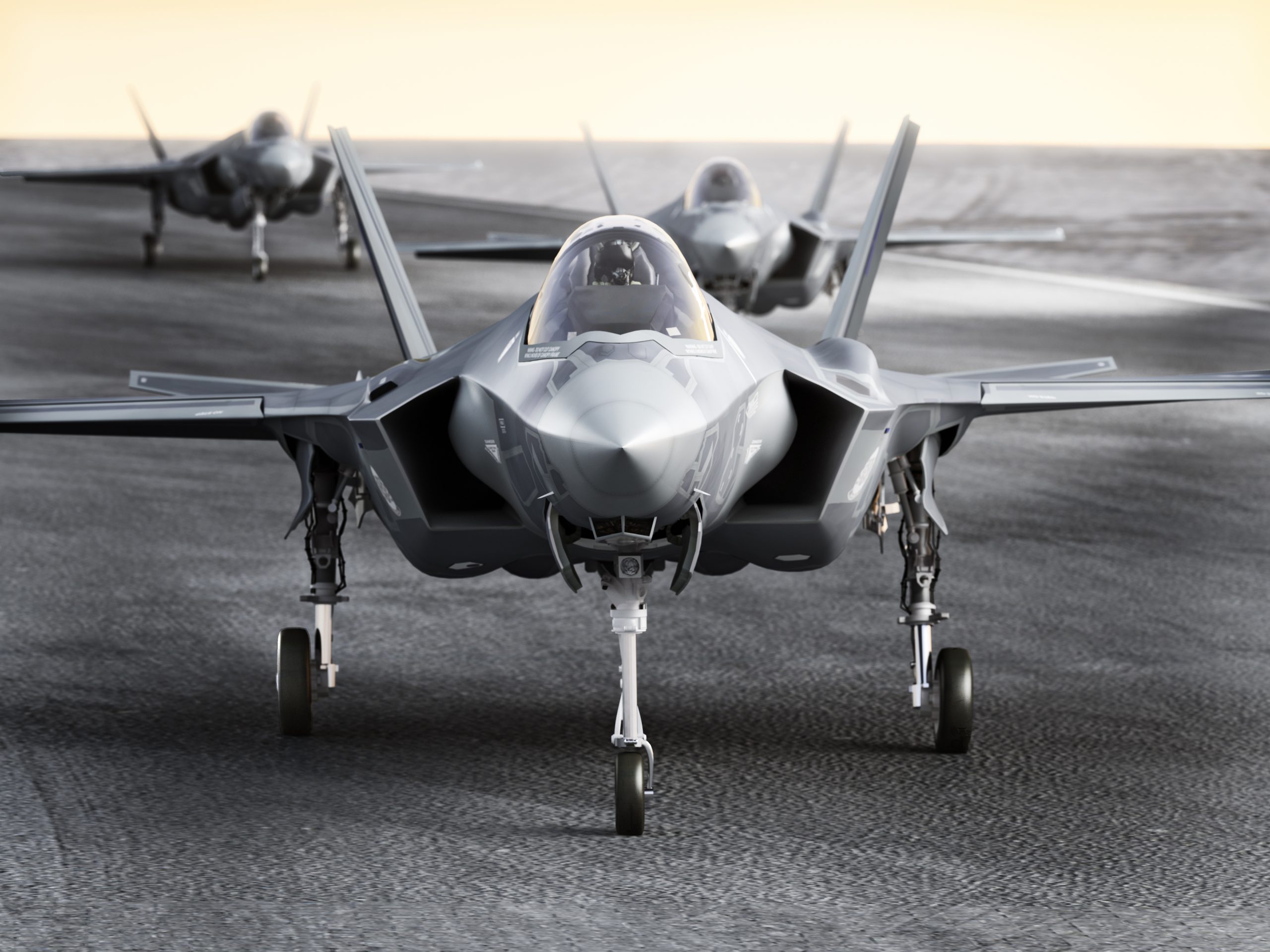
The air defense industry is growing due to increased military tensions around the world, prompting nations to bolster their defense capabilities, leading to higher defense spending. Moreover, the adoption of new technologies is boosting the industry’s growth prospects.
So, it could be wise to add fundamentally strong defense stocks, Grupo Aeroportuario del Sureste, S. A. B. de C. V. (ASR), Air Lease Corporation (AL), Textron Inc. (TXT), Moog Inc. (MOG.A), and Willis Lease Finance Corporation (WLFC) to one’s watchlist.
Before diving deeper into the fundamentals of these stocks, let’s discuss what’s shaping the defense industry’s prospects.
Rising defense spending by developed and emerging nations is creating substantial expansion opportunities for defense firms as countries prioritize military preparedness.
The industry's prospects are also being positively influenced by growing geopolitical tensions and evolving warfare dynamics, evident in conflicts like those in Ukraine and Israel, along with the recent Houthi attacks heightening concerns of broader Middle Eastern conflict.
Growing air warfare complexities and heightened threats fuel the need for robust air defense systems. The U.S. Congress approved the historic National Defense Authorization Act (NDAA), which authorizes $886 billion in annual military spending, marking a 3% increase to the nation’s total national security budget.
The Air Force's budget request for fiscal 2024 is $215.10 billion, marking a 4.5% increase from 2023. Increased defense spending and heightened threats are expected to propel the air defense systems market to grow at a projected CAGR of 7.4%, reaching $21.41 billion by 2027. The aerospace and defense market is anticipated to grow at a 5.9% CAGR to reach $1.08 trillion by 2027.
Furthermore, technological advances are helping transform modern warfare by improving missile and air defense systems by integrating radar, artificial intelligence, and analytics. The use of AI and robotics in the aerospace and defense market is projected to rise from $31.90 billion in 2024 to $45.80 billion in 2029, registering a CAGR of 7.5%.
In light of this context, let’s analyze the fundamentals of the five Air/Defense Services stocks, beginning with the fifth choice.
Stock #5: Grupo Aeroportuario del Sureste, S. A. B. de C. V. (ASR)
Headquartered in Mexico City, Mexico, ASR holds concessions to operate, maintain, and develop airports in the southeast region of Mexico. It provides aeronautical services, including passenger services, aircraft landing and parking, passenger walkways, and airport security services.
On December 14, 2023, ASR announced approval of its 2024-2028 investment plan totaling Ps.28.5 billion ($1.66 billion), including maximum tariffs and efficiency factors, for its Mexican concessions, following approval from the Mexican Department of Infrastructure, Communications, and Transportation.
In terms of the trailing-12-month gross profit margin, ASR’s 59.18% is 94% higher than the 30.50% industry average. Likewise, its 57.76% trailing-12-month EBIT margin is 501% higher than the 9.61% industry average. Furthermore, its 39.01% trailing-12-month net income margin is 552.9% higher than the 5.98% industry average.
For the third quarter ended September 30, 2023, ASR’s total revenue increased 0.7% year-over-year to Ps.6.34 billion ($369.99 million). Its net income also rose 6.4% over the prior-year quarter to Ps.2.71 billion ($158.15 million). Additionally, its earnings per share came in at Ps.5.18, up 6.4% year-over-year.
Street expects ASR’s EPS for the quarter ended December 31, 2023, to increase 21.3% year-over-year to $5.32. Likewise, its revenue for the quarter ending March 31, 2024, is expected to increase 38.9% year-over-year to $496.61 million. It surpassed the Street EPS estimates in three of the trailing four quarters. Over the past three months, the stock has gained 37.9% to close the last trading session at $295.95.
ASR’s bright prospects are reflected in its POWR Ratings. It has an overall rating of B, which translates to a Buy in our proprietary rating system. The POWR Ratings assess stocks by 118 different factors, each with its own weighting.
It is ranked #18 out of 72 stocks in the Air/Defense Services industry. It has a B grade for Momentum, Sentiment, and Quality. In addition to the POWR Ratings grades I’ve just highlighted, you can see ASR’s ratings for Growth, Value, and Stability here.
Stock #4: Air Lease Corporation (AL)
AL is an aircraft leasing company that engages in the purchase and leasing of commercial jet aircraft to airlines worldwide. It also sells aircraft from its fleet to third parties, including other leasing companies, financial services companies, airlines, and other investors.
On November 6, 2023, AL announced the delivery of the first of seven new Airbus A321-200neo aircraft to Transavia. This marks the beginning of a long-term lease agreement and introduces the A321-200neo to Transavia's fleet, enhancing its service offerings and efficiency.
In terms of the trailing-12-month EBIT margin, AL’s 50.98% is 430.5% higher than the 9.61% industry average. Likewise, its 91.72% trailing-12-month Capex/Sales is considerably higher than the 2.96% industry average. Also, its 20.97% trailing-12-month net income margin is 250.9% higher than the 5.98% industry average.
AL’s revenues for the fiscal third quarter that ended September 30, 2023, rose 17.5% year-over-year to $659.40 million. Likewise, the company’s adjusted net income before income taxes and adjusted EPS before income taxes stood at $177 million and $1.59, up 21% and 20.5% over the prior-year quarter.
Analysts expect AL’s EPS and revenue for the quarter ended December 31, 2023, to increase 0.4% and 12.1% year-over-year to $1.12 and $674.18 million, respectively. It surpassed the consensus EPS estimates in three of the trailing four quarters. Over the past three months, the stock has gained 12.5% to close the last trading session at $41.37.
AL’s POWR Ratings reflect strong prospects. It has an overall rating of B, translating to a Buy in our proprietary rating system.
It has a B grade for Momentum and Sentiment. It is ranked #17 in the same industry. To see AL’s Growth, Value, Stability, and Quality ratings, click here.
Stock #3: Textron Inc. (TXT)
TXT operates in the aircraft, defense, industrial, and finance businesses worldwide. It operates through six segments: Textron Aviation, Bell, Textron Systems, Industrial, Textron eAviation, and Finance.
In terms of the trailing-12-month levered FCF margin, TXT’s 7.30% is 16.3% higher than the 6.28% industry average. Likewise, its 6.73% trailing-12-month net income margin is 12.7% higher than the 5.98% industry average. Furthermore, its 5.46% trailing-12-month Return on Total Assets is 11.5% higher than the 4.90% industry average.
For the fourth quarter that ended December 31, 2023, TXT’s total revenues increased 7.04% year-over-year to $3.89 billion. Its gross profit rose 25.5% from the year-ago value to $384 million. Moreover, the company’s adjusted income from continuing operations rose 22.5% and 30.1% year-over-year to $316 million and $1.60 per share, respectively.
Street expects TXT’s EPS and revenue for the quarter ending March 31, 2024, to increase 22.8% and 8.6% year-over-year to $1.29 and $3.29 billion, respectively. It surpassed the Street EPS estimates in each of the trailing four quarters. Over the past nine months, the stock has gained 35.9% to close the last trading session at $86.
TXT’s solid prospects are reflected in its POWR Ratings. It has an overall rating of A, which translates to a Strong Buy in our proprietary rating system.
It is ranked #4 in the Air/Defense Services industry. It has a B grade for Growth, Value, Momentum, and Quality. In addition to the POWR Ratings grades I’ve just highlighted, you can see TXT’s ratings for Stability and Sentiment here.
Stock #2: Moog Inc. (MOG.A)
MOG.A designs, manufactures, and integrates precision motion and fluid controls and controls systems for original equipment manufacturers and end users in the aerospace, defense, and industrial markets internationally.
In terms of the trailing-12-month Capex/Sales, MOG.A’s 5.29% is 78.4% higher than the 2.96% industry average. Likewise, its 7.72% trailing-12-month Return on Total Capital is 13.8% higher than the 6.79% industry average. Furthermore, its 0.89x trailing-12-month asset turnover ratio is 11.4% higher than the 0.80x industry average.
MOG.A’s revenues for the fiscal first quarter that ended December 31, 2023, rose 12.8% year-over-year to $857 million. Its net cash provided by operating activities increased 650% over the prior-year quarter to $60 million. Additionally, the company’s adjusted net earnings per share stood at $1.53, up 22.4% year-over-year.
For the quarter ending March 31, 2024, MOG.A’s EPS and revenue are expected to increase 18.8% and 4.4% year-over-year to $1.69 and $873.58 million, respectively. It surpassed the consensus EPS estimates in three of the trailing four quarters. Over the past nine months, the stock has gained 55.8% to close the last trading session at $141.90.
MOG.A’s strong fundamentals are reflected in its POWR Ratings. It has an overall rating of A, translating to a Strong Buy in our proprietary rating system.
It has a B grade for Growth, Momentum, Stability, and Sentiment. It is ranked #3 in the same industry. In total, we rate MOG.A on eight different levels. Beyond what we stated above, we have also given MOG.A grades for Value and Quality. Get all the MOG.A’s ratings here.
Stock #1: Willis Lease Finance Corporation (WLFC)
WLFC operates as a lessor and servicer of commercial aircraft and aircraft engines worldwide. The company operates through two segments: Leasing and Related Operations and Spare Parts Sales.
In terms of the trailing-12-month Capex/Sales, WLFC’s 45.04% is considerably higher than the 2.96% industry average. Likewise, its 33.80% trailing-12-month EBIT margin is 251.7% higher than the 9.61% industry average. Furthermore, its 57.46% trailing-12-month EBITDA margin is 324% higher than the 13.55% industry average.
WLFC’s total revenue for the fiscal third quarter ended September 30, 2023, increased 37.5% year-over-year to $105.75 billion. The company’s income from operations increased 128.7% year-over-year to $20 million. In addition, its net income attributable to common shareholders and income per common share rose 148.3% and 139.3% over the prior-year quarter to $13.78 million and $2.13, respectively.
Over the past three months, WLFC’s stock has gained 6.6% to close the last trading session at $47.39.
WLFC’s favorable outlook is reflected in its POWR Ratings. It has an overall rating of A, translating to a Strong Buy in our proprietary rating system.
It has a B grade for Growth, Value, Momentum, Sentiment, and Quality. It is ranked first in the Air/Defense Services industry. In total, we rate WLFC on eight different levels. Beyond what we stated above, we have also rated WLFC for Stability. Get all ratings of WLFC here.
What To Do Next?
43 year investment veteran, Steve Reitmeister, has just released his 2024 market outlook along with trading plan and top 11 picks for the year ahead.
TXT shares were trading at $86.31 per share on Wednesday afternoon, up $0.31 (+0.36%). Year-to-date, TXT has gained 7.32%, versus a 4.39% rise in the benchmark S&P 500 index during the same period.
About the Author: Abhishek Bhuyan

Abhishek embarked on his professional journey as a financial journalist due to his keen interest in discerning the fundamental factors that influence the future performance of financial instruments.
February Air Defense Stock Watchlist StockNews.com






